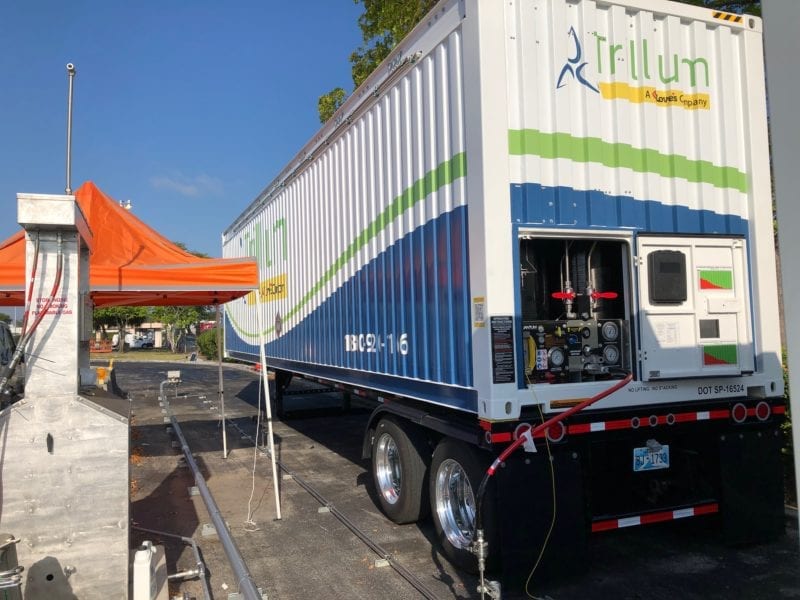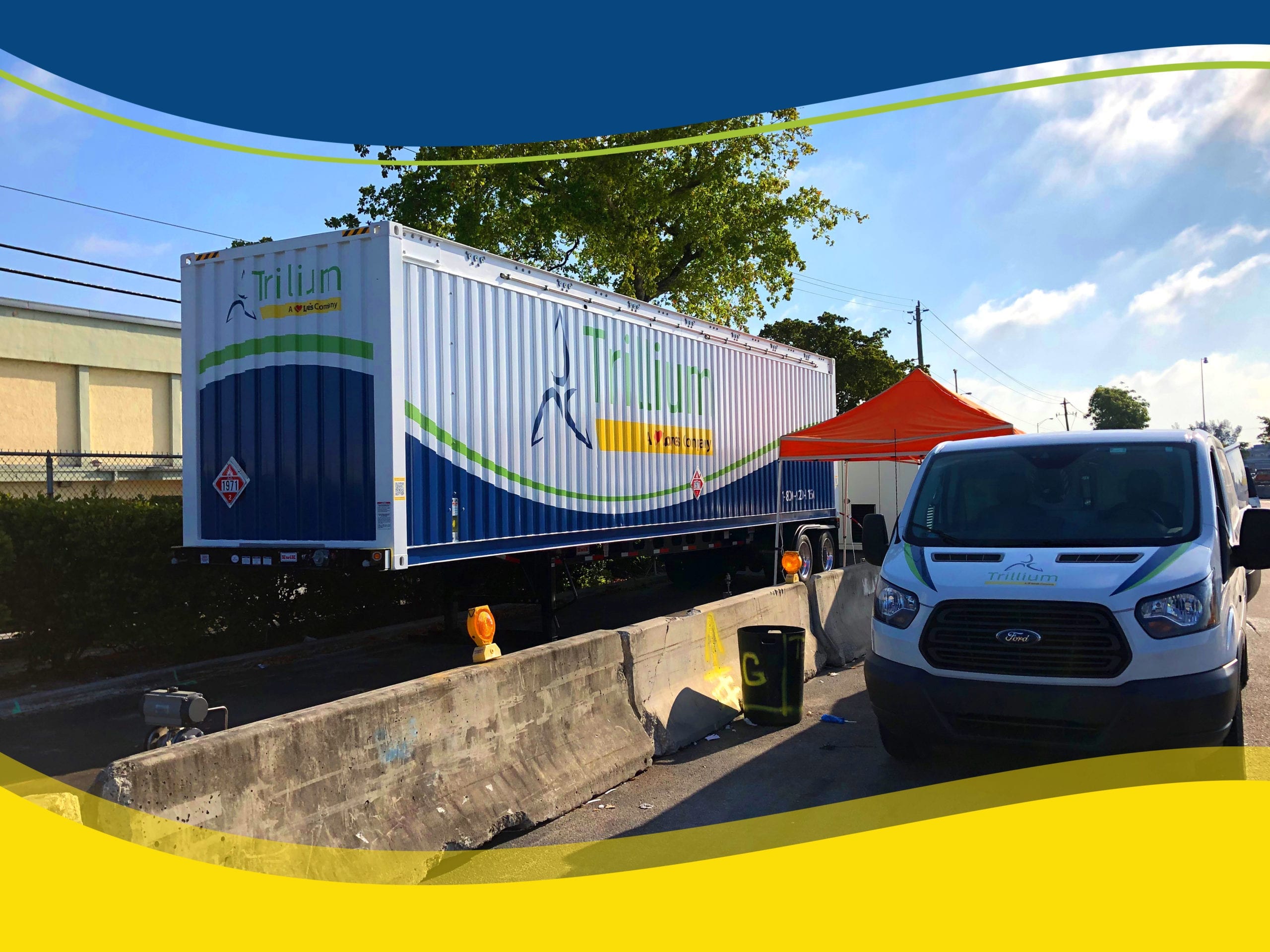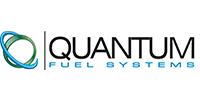In partnership with: Trillium

Businesses, organizations, and communities across the country are making history by setting ambitious emissions reduction targets in corporate sustainability plans and climate mitigation strategies. For organizations that operate vehicles as part of their business, these efforts are often aimed at reducing, or eliminating, emissions from their fleet.
Natural gas has proven to be a best fit for the medium- and heavy-duty fleet sector with transit, goods movement, urban delivery, and refuse industries relying on natural gas to meet the demanding needs of their operations every day. While larger fleets may have easy access to natural gas fueling through a variety of public and private fueling stations, smaller fleets in remote communities are often left in a precarious position.
While larger fleets may have easy access to natural gas fueling, smaller fleets in remote communities are often left in a precarious position.
Without access to sufficient natural gas fueling infrastructure, these fleets often rely on older, outdated diesel technology for far too long. Besides producing more emissions, these vehicles can also cost much more in the long run due to increased maintenance costs, unpredictable fuel expenses, and increased overall operating costs.
While natural gas vehicles may be a natural fit for medium- and heavy-duty transportation, in-ground natural gas infrastructure can be cost-prohibitive for some communities.
Other zero emission technology solutions, including battery electric or hydrogen fuel cell electric vehicles, also require costly infrastructure upgrades and the vehicles are prohibitively expensive for widespread commercial use.
A Virtual Solution
Instead of relying on higher polluting diesel vehicles for the foreseeable future, virtual pipeline technology offers a practical, clean energy infrastructure solution today.
Virtual pipeline technology offers a practical, clean energy infrastructure solution today.
Rural communities, de-centralized fleets, and just-off-the-grid temporary projects can fuel with the same low emission natural gas that would have otherwise only been accessible at a fueling station located miles away. Virtual pipeline technology presents an advanced mobile fueling solution for fleets that previously couldn’t consider clean vehicle technology.
Flexibility Built-In from the Beginning
When Trillium designs and builds fueling stations across the US, each sites’ specific needs are taken into consideration.
When Trillium designs and builds fueling stations across the US, each sites’ specific needs are taken into consideration.
Based on fleet proximity and location, public and private Trillium natural gas fueling stations are designed to accommodate various mobile fueling solutions, including virtual pipeline. A good example of this flexibility being baked in from day one can be seen in Pennsylvania with Trillium’s award-winning public-private partnership project with the Pennsylvania Department of Transportation, PennDOT. Public CNG fueling stations located in Johnstown, Allentown, York, and Erie can not only accommodate retail fueling, but also have the capacity and space to fill large tube trailers to bring CNG to customers who may require a VPL solution—wherever they’re located.
When fueling at a public retail station isn’t realistic, and a private station isn’t feasible, a fleet does not need to fall back on diesel vehicles. Instead, utilizing virtual pipeline technology, the fleet can transport fuel safely and cost effectively to their location—bringing a mobile clean fueling option wherever it is needed.
How It Works
Trillium partners with leading CNG transport and storage system provider, Quantum Fuel Systems, to provide fleets with a diverse portfolio of innovative storage and virtual fueling solutions. Known for pioneering many industry firsts, Quantum remains the most innovative leader in virtual pipeline technology.
Virtual pipeline technology works by compressing and dispensing natural gas, from a centralized private or public station, into lightweight, high-capacity trailers. Once stored safely in the trailer, compressed natural gas can then be easily transported, delivered, and stored long-term nearly anywhere it’s needed.
By eliminating natural gas pipeline infrastructure, fleets that previously would not have been able to consider natural gas now have a clean fuel option.
By eliminating natural gas pipeline infrastructure, fleets that previously couldn’t consider, let alone access, natural gas, now have a clean fuel option.
Utilizing a virtual pipeline CNG trailer also means a continual, uninterrupted fuel supply.
At 10-, 20-, 40- and 45-foot lengths, Quantum offers transport and storage solutions for every fleets’ needs. While Quantum’s maneuverable, lightweight trailers are geared towards temporary projects or smaller fleets, their largest container to remain under the 80,000 pound over the road limit, hauls up to 474,323,000 square cubic feet of CNG—that’s the equivalent of over 3,900 DGE of CNG.

A Quantum Trillium virtual pipeline trailer being filled with CNG.
Temporary Scale for Temporary Projects
Virtual pipeline and mobile fueling solutions don’t just work for small fleets, rural communities, or off-the grid-projects. Virtual pipeline technology can be used as fleets’ needs evolve and change.
For temporary projects, seasonal work, construction sites, and industrial applications, virtual pipeline technology offers time- and cost-effective fueling options available when fleets need them most.
Virtual pipeline technology can be used as fleets’ needs evolve and change.
Unbeatable Fueling Value
CNG already offers considerable cost savings when compared to diesel and gasoline. Fleets typically see 30% to 50% cost savings on a diesel gallon equivalent basis when fueling with CNG over diesel. A plentiful and domestically produced resource, fleets fueling with CNG avoid both the expense and the unpredictable price spikes synonymous with imported diesel and gasoline.
A plentiful and domestically produced resource, fleets fueling with CNG avoid unpredictable price spikes synonymous with imported fuels.
Quantum manufactures both the CNG tanks and system, supplying fleets with the industry’s most cost-competitive products that have already withstood 1 million miles of testing.
When fleets are laser-focused on both cost and emission reductions, virtual pipeline technology offers the uninterrupted flexibility and unmatched cost savings that today’s fleets need. To learn more about Trillium’s portfolio of fueling solutions, visit www.loves.com/trillium.
This article was produced in partnership with Quantum Fuel Systems, a leading CNG transport and storage system provider.
Learn more about Quantum Fuel Systems at www.qtww.com
Quantum Fuel Systems is engineering the future of alternative fuel storage by designing, developing and bringing innovative transport trailers, and industry-leading Type 4 cylinders for hydrogen and CNG to market. Quantum is at the forefront of the industry with decades of experience in gaseous fuel storage and systems solutions.



